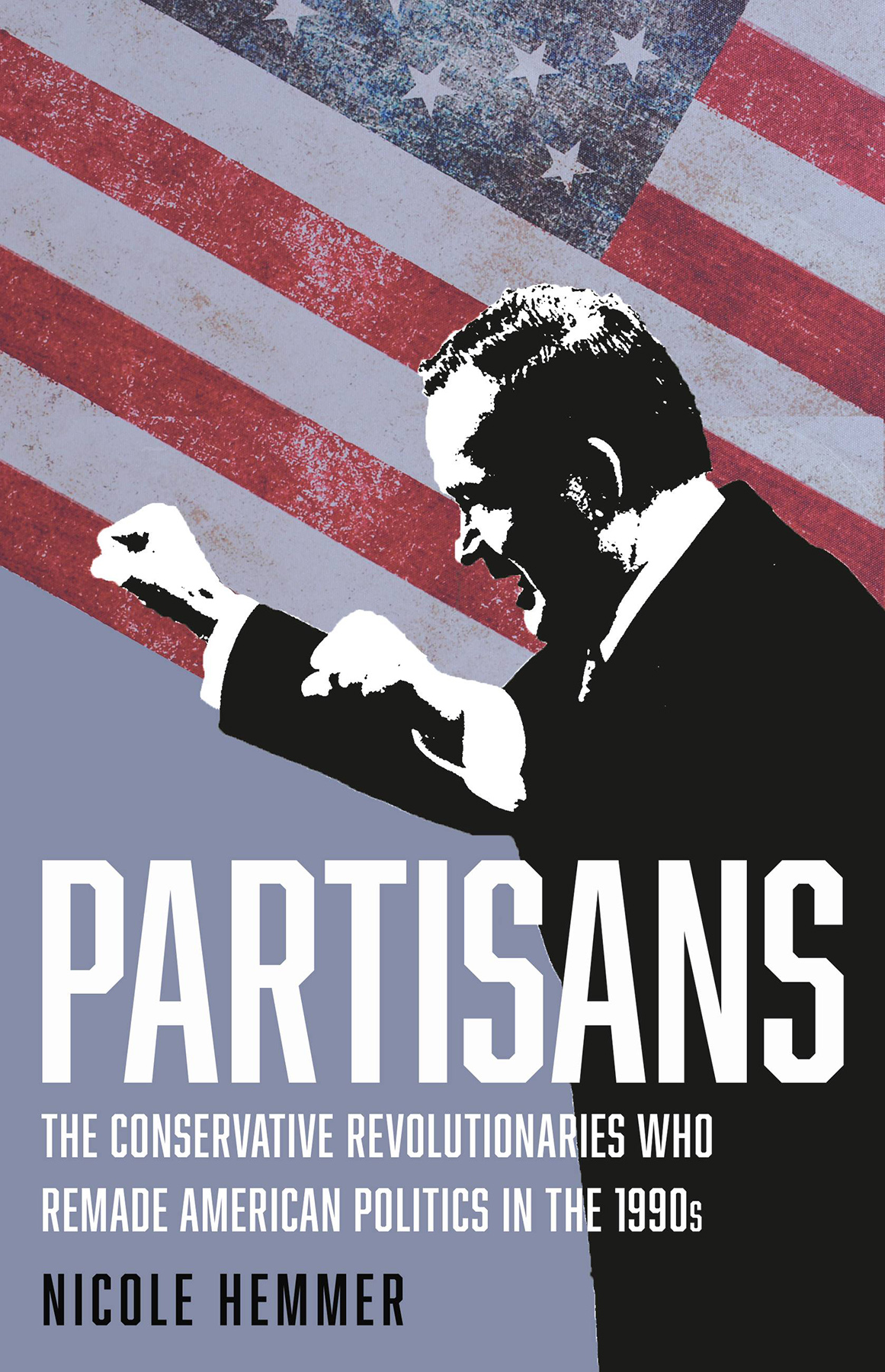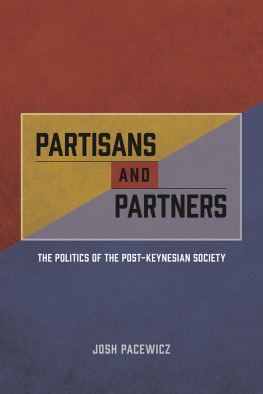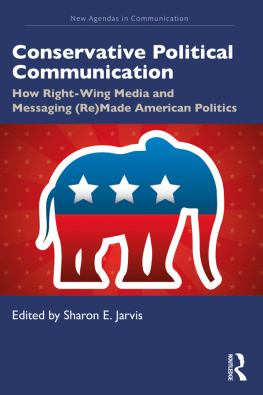
Copyright 2022 by Nicole Hemmer
Cover design by Rebecca Lown
Cover images Associated Press; laura.h / Shutterstock.com
Cover copyright 2022 by Hachette Book Group, Inc.
Hachette Book Group supports the right to free expression and the value of copyright. The purpose of copyright is to encourage writers and artists to produce the creative works that enrich our culture.
The scanning, uploading, and distribution of this book without permission is a theft of the authors intellectual property. If you would like permission to use material from the book (other than for review purposes), please contact permissions@hbgusa.com. Thank you for your support of the authors rights.
Basic Books
Hachette Book Group
1290 Avenue of the Americas, New York, NY 10104
www.basicbooks.com
First Edition: August 2022
Published by Basic Books, an imprint of Perseus Books, LLC, a subsidiary of Hachette Book Group, Inc. The Basic Books name and logo is a trademark of the Hachette Book Group.
The Hachette Speakers Bureau provides a wide range of authors for speaking events. To find out more, go to www.hachettespeakersbureau.com or call (866) 376-6591.
The publisher is not responsible for websites (or their content) that are not owned by the publisher.
Library of Congress Cataloging-in-Publication Data
Names: Hemmer, Nicole, author.
Title: Partisans : the conservative revolutionaries who remade American politics in the 1990s / Nicole Hemmer.
Description: First edition. | New York : Basic Books, [2022] | Includes bibliographical references and index. |
Identifiers: LCCN 2021057105 | ISBN 9781541646889 (Hardcover) | ISBN 9781541646872 (eBook)
Subjects: LCSH: ConservatismUnited StatesHistory20th century. | ConservatismUnited StatesHistory21st century. | Reagan, RonaldInfluence. | Buchanan, Patrick J. (Patrick Joseph), 1938Influence. | Political cultureUnited States. | United StatesPolitics and government1989
Classification: LCC E743 H38 2022 | DDC 320.520973/0904dc23/eng/20220506
LC record available at https://lccn.loc.gov/2021057105
ISBNs: 9781541646889 (print), 9781541646872 (ebook)
E3-20220707-JV-NF-ORI
For my mom
T his book began with a puzzle.
In most accounts of twentieth-century politics, the victory of Ronald Reagan in 1980 marks a turning point, when the country shifted hard right after decades of liberal governance. His eight years in office were the crowning achievement for a group of conservative activists who had been trying to capture the presidency for decades. They had long been convinced they represented the vast majority of the American people, but election after election, the results at the polls had told a different story. Until Reagan.
Swept into office with overwhelming majoritieswinning forty-four states in 1980 and forty-nine in 1984Reagan provided proof of what the right had believed all along: if someone could advocate for conservatism cogently and charismatically, the hidden majority of conservative Americans would emerge. And so it began, the start of a new period in US history defined by the new presidents conservative politics: the Reagan era.
Only after a decade of studying Cold War conservatism, I saw those victories less as a beginning than as an end. Nearly as soon as Reagan left office, the conservative movement he represented began to rapidly evolve, skittering away from the policies, rhetoric, and even ideology that Reagan had brought into office. Republicans still had significant political power, and the 1990s were a conservative era, but with each passing year, conservatives looked less and less like Reagan, even as they invoked his name more and more.
Unpacking that puzzle required making sense of two things: Reagans transformative effect on the conservative movement in the 1980s and the quick dissipation of the conditions that made the Reagan era possible.
In the 1980s, Reagan embodied a conservatism that was optimistic and popular, two things the American right had not been for most of the twentieth century. The Cold War conservatism that emerged in the 1950s had been born as a frustrated yawp from a group of activists, writers, and broadcasters convinced that the two major parties and most of the media in the United States were systematically shutting out their views. Some of their perspectiveslike their belief that both the New Deal and communism represented an existential threat to the United States and should be wiped out, whatever the costhad few adherents in the decades between the end of World War II and Reagans election. Otherslike their belief that society had a natural hierarchy, topped by white Christian men, that must be maintainedwere deeply embedded in US culture and politics and would not begin to lose significant support until the 1960s and 1970s.
But when packaged together in the Cold War conservative movement, the rights blend of militant anticommunism, traditional
That effort to explain and expand conservatism was necessary not only because Cold War conservatives were in a distinct political minority but also because they were redefining the American right. Before the Cold War, what became known as the Old Right had distinctly different politics from what came after. It shared Cold War conservatisms antiunionism and antiNew Deal politics. But the Old Right, represented by people like Republican senator Robert Taft, newspaper publisher Robert E. Wood, and writer John T. Flynn, was also profoundly opposed to military intervention abroad, including US involvement in World War II. Nor did it embrace the idea of free markets, preferring instead a protectionist order that included extensive tariffs. A strain of the Old Right even opposed modern industrial capitalism, believing republicanism only thrived in an agrarian order. The Cold War, with its emphasis on the rhetoric of freedom and its tendency to redefine US politics in opposition to communism, fundamentally transformed the conservative movement.
The Cold War right that replaced the Old Right was also obsessed with the presidency. That was in part a function of its
The focus on the presidency also grew out of the specific circumstances of presidential politics in the 1950s. As the Old Right was giving way to Cold War conservatism, movement conservatives backed Robert Taft, the Ohio senator known as Mr. Republican, for the GOP presidential nomination in 1952. When Dwight Eisenhower, a celebrity general with no previous party allegiance, won the nomination, conservatives felt cheatedand were convinced that liberal elites in the party had stolen the nomination from them. That formative experience shaped the founding of National Review , the conservative journal of opinion started by William F. Buckley Jr. in 1955. In its first issue, a writer blamed a small band of Eastern financiers, international bankers and industrialists for snatching the nomination from Taft.
Again and again, right-wing activists sought alternatives to what they saw as moderate and liberal nominees: the third-party States Rights candidacy of T. Coleman Andrews in 1956, the Republican primary boomlet for Arizona senator Barry Goldwater in 1960. In 1964, they finally succeeded, snagging the Republican nomination for Goldwater in a victory so profound that it triggered a party realignment: the Republican Party would become the home of the American right, welcoming conservative white Democrats, while
Goldwaters dramatic loss to President Lyndon Johnsonthe largest popular-vote defeat in nearly 150 yearsobscured the radical change the Republican Party was undergoing. Four years later, movement conservatives and the Republican Party seemed to have struck a truce of sorts: activists like Buckley embraced Richard Nixons candidacy as good enough. He wasnt as conservative as they would like, but he was attentive to the movement, even bringing aboard writer Pat Buchanan, a young right-wing firebrand, as an ambassador between the administration and the movement. Still, other conservatives remained suspicious of Nixon, opting instead for George Wallace, the segregationist governor of Alabama whose third-party candidacy drew 13.5 percent of the popular vote in the general election.






